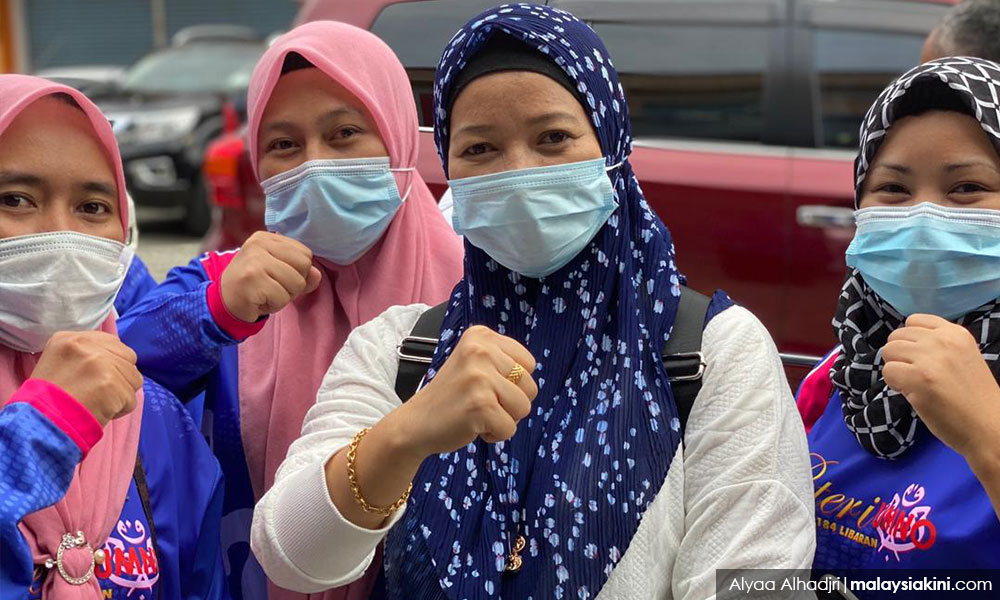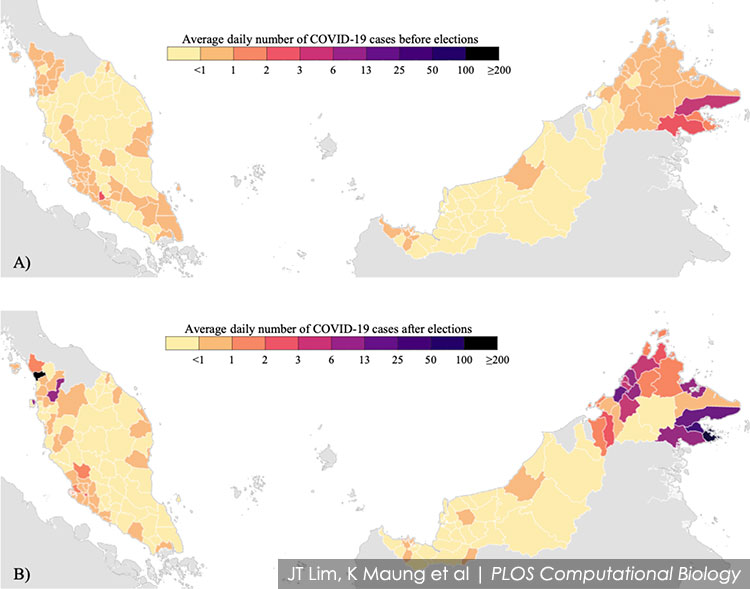The Sabah state election last year had resulted in an estimated 2,979 Covid-19 cases in the first few weeks after polling day, according to a new analysis published on Thursday.
This amounts to 70 percent of cases reported in the state from Sept 26 (polling day) until Oct 12 when the government began imposing the conditional movement control order in Sabah and several other states to curb the outbreak.
The number of cases varies from district to district and goes as high as 95.7 percent in Semporna, 79.5 percent in Tawau, and 96.7 percent in Lahad Datu.
Outside of Sabah, the study estimated that 64.4 percent of Covid-19 cases during that period can be attributed to spillover effects from the election, amounting to another 1,741 cases.
This brings the national total to 4,720 cases linked to the election in 17 days.
Most of these are in urban centres in Peninsular Malaysia such as Petaling district, Kuala Lumpur, and Johor, but all 114 districts outside Sabah that reported Covid-19 cases at the time experienced the spillover effect to some degree.
“We demonstrate that our estimates are not due to pre-existing epidemiological trends, surveillance efforts, and/or preventive policies. These estimates highlight the potential of mass gatherings in one region to spill over into an outbreak of national scale.
“Relaxations of mass gathering restrictions must therefore be carefully considered, even in context of low community transmission and enforcement of safe distancing guidelines,” the authors of the study wrote.
The study is based on computer modelling of the Covid-19 trends in Malaysia from March 22 to Oct 12, the latter date being the eve of the start of the conditional MCO being imposed on Kuala Lumpur, Putrajaya, Selangor, and the whole of Sabah.
The study was performed by a group based mostly at the National University of Singapore’s Saw Swee Hock School of Public Health, and which aimed to use the Sabah election as a case study to gauge how mass gatherings could lead to Covid-19 outbreaks.
Their paper is published in the peer-reviewed journal PLOS Computational Biology.
Major spike
The authors noted that during the period from June 10 up to the polling day on Sept 26 last year, Malaysia reported only around 16 confirmed Covid-19 cases per day.
In the 17 days after the election up to the implementation of the conditional MCO, however, this increased to about 190 cases per day, of which around 154 per day were in Sabah.
The Sabah election was triggered when former Sabah chief minister Musa Aman attempted to engineer a coup to seize control of the Sabah government through defections of government assemblypersons on July 29, 2020.
Shafie Apdal, who was chief minister at the time, responded by dissolving the state assembly, foiling the coup attempt and paving way for the election.
Citing press reports, the authors of the study noted that Covid-19 risks in Sabah was initially low but non-zero, and was coupled with high compliance with mask-wearing, physical distancing, and temperature checks.
On the other hand, gatherings with unlimited attendees outdoors and up to 250 indoors increased the risk of transmission.
“Additionally, campaigning politicians, their entourages, and rally attendees were reported to have had poor adherence to safe distancing and mask-wearing guidelines at events.
“Although policies were rapidly changed, limiting attendee numbers to 30 for political talks, the high transmissibility of Covid-19 and cumulated increased risk of infection spread may have been sufficient to lead to increased post-election Covid-19 case counts within the state,” they said.

Coupled with interstate travel due to the election and delays in containing the outbreak, this allowed returnees from Sabah to seed new outbreaks in other states.
Previously, Prime Minister Muhyiddin Yassin had acknowledged a link between campaign activities in Sabah and the third wave of Covid-19 cases in Malaysia, which continues to this day.
The government has since resorted to a series of localised emergency proclamations to postpone by-elections, culminating in a nationwide emergency order that is in effect since Jan 11.
Yesterday, the government announced a full lockdown for two weeks starting Tuesday after the country hit a record number in new cases. - Mkini




No comments:
Post a Comment
Note: Only a member of this blog may post a comment.